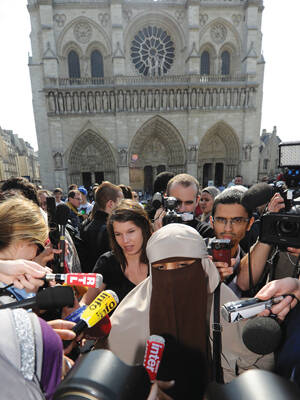France’s Catholic bishops have urged citizens to accept the fact that their country is no longer culturally homogeneous and to be ready to look at candidates in new ways as the nation’s 2012 presidential election approaches.
The bishops’ declaration, presented in Paris on Oct. 3, said the global financial crisis had added to existing “social and political difficulties” and coincided with a “formidable development of scientific techniques” that risked a backlash against human dignity. It said mass immigration had ended the “cultural homogeneity” of Western societies, while the spread of individualism risked damaging social life and the sense of a common good.
“For citizens of more or less old stock, this provokes a sense of instability which is hard to live with, while for many new arrivals it translates into a feeling of being ill accepted and unable to find one’s place in a society one cannot leave,” the bishops’ council said. “These transformations question our conception of man, his dignity and vocation and confront rulers and legislators with new questions. The outbreak of ethnic references poses an ever heavier moral weight in the formulation of laws,” it added.
“Voting cannot just be dictated by habit, membership in a social class or the pursuit of particular interests—it should take account of the challenges presenting themselves and aim for what could make our country nicer and more humane to live in,” said the permanent council of the bishops’ conference, headed by Cardinal André Vingt-Trois of Paris.
Catholics traditionally make up two-thirds of France’s 60 million inhabitants, although fewer than one in 10 attends Sunday Mass. Before winning the country’s presidential election in May 2007 on a platform of public-sector reforms and curbs on crime and immigration, President Nicolas Sarkozy, a Catholic, pledged to improve ties with religious communities. Since his election, he has called for religion to play a more prominent part in public life. The president is seeking a second term in the April-May 2012 election but is expected to face challenges from candidates within and outside his party.
The bishops’ council said that when considering a candidate, voters should look at protection of life and the family as well as “freedom and responsibility of parents” in education and help for the handicapped and dying. It said Catholics should also consider what presidential candidates offered to improve life in poor communities around France’s cities, safeguard the environment, secure economic justice and strengthen international cooperation.
“In recent debates, certain excessive reactions have shown that intolerance toward the Catholic Church [and religions in general] is not just a remnant of the past,” the bishops’ council said. “As citizens in a democratic society, Catholics do not intend to be barred from speaking. In explaining what they think, they are not going against the intelligence and free judgment of those who do not share their faith. Instead, they favor calm, open application of the laws and rules that define the secular pact of our shared republic.”








